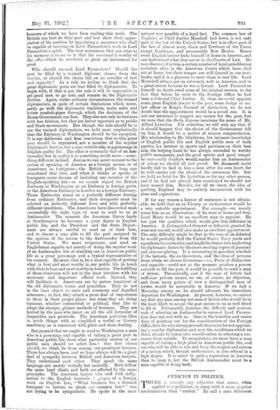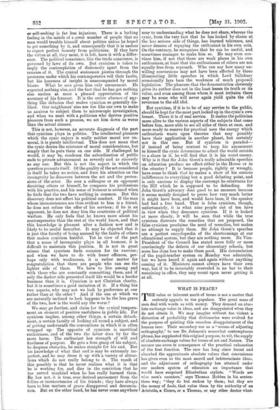CYNICISM IN POLITICS.
THERE is scarcely any adjective that seems, when applied to a politician, to carry with it more popular condemnation than "cynical." To call a man dishonest or self-seeking is far less injurious. There is a lurking feeling in the minds of a great number of people that no man would trouble himself about politics unless he hoped to get something by it, and consequently that it is useless to expect perfect honesty from politicians. If they have the virtue at all, they must, it is felt, have it with a differ- ence. The political conscience, like the trade conscience, is governed by laws of its own. But cynicism is taken to imply the contemplation of dishonesty apart from the censure of it. The cynical statesman pierces through the pretences under which his contemporaries veil their faults, but his keenness of insight is unaccompanied by moral blame. What he sees gives him only amusement. He expected nothing else, and the fact that he has got nothing else excites at most a pleased appreciation of the accuracy of his forecast. It is the entire absence of any- thing like delusion that makes cynicism so generally dis- liked. Our neighbours' sins are too like our own to make us anxious to subject them to microscopic investigation, and when we meet with a politician who derives positive pleasure from such a process, we set him down as worse than the actual sinners.
This is not, however, an accurate diagnosis of the part that cynicism plays in politics. The intellectual pleasure which the cynic enjoys is really neither moral nor im- moral, it is purely intellectual. This does not mean that the cynic denies the existence of moral considerations, but simply that he puts them on one side. If challenged he would, it may be, condemn the subordination of public ends to private advancement as severely and as sincerely as any one. But this is not the aspect in which the question presents itself. Of the quality of the act considered in itself he takes no notice, and fixes his attention on the incongruity he discovers between the act and the preten- sions of the actor. He sees a colleague or an opponent deceiving others or himself, he compares his professions with his practice, and his sense of humour is aroused when he finds that the two have nothing in common. But this discovery does not affect his political conduct. If the man whose inconsistencies are thus evident to him is a friend, he does not refuse the offer of his services ; if he is an opponent, he does not deny him the courtesies of political warfare. He only feels that he knows more about his contemporaries than the rest of the world know, and that this knowledge is pleasant after a fashion now and is likely to be useful hereafter. It may be objected that it is just this faculty of being amused by the faults of others that makes cynicism hateful. Yet in view of the part that a sense of incongruity plays in all humour, it is difficult to maintain this position. It is not in great crimes that cynicism finds occasion for its exercise ; and when we have to do with lesser offences, per- haps only with weaknesses, it is rather matter for congratulation that there are people who can see the lighter side of them. We have to live among and with those who are constantly committing them, and if only the darker side presented itself life would be a harder business than it is. Cynicism is not Christian charity, but it is sometimes a good imitation of it. If a thing has two aspects, why may not we look by preference at one rather than at the other ? And if the one at which we are naturally inclined to look happens to be the less grave of the two, how is the world any the worse ?
We may go further, and claim for the cynical tempera- ment an element of positive usefulness in public life. For cynicism implies, among other things, a certain detach- ment, a certain faculty of looking all round a subject, and of getting underneath the conventions in which it is often wrapped up. The opposite of cynicism is uncritical enthusiasm, and of the two the latter does by far the more harm. The enthusiast has strength of will and fixedness of purpose. He gets a firm grasp of his subject, he despises obstacles, he makes straight for his end. But his knowledge of what that end is may be extremely im- perfect, and he may dress it up with a variety of attrac- tions which do not really belong to it. The result of this possibly is that he never realises what it is that he is working for, and dies in the conviction that he has served mankind when he has really harmed them. He has not, it is true, ever derived amusement from the follies or inconsistencies of his friends ; they have always been to him matters of grave disapproval and denuncia- tion. But on the other hand, he has never come anywhere near to understanding what he does not share, whereas the cynic, from the very fact that he has looked by choice at the less serious side of things, has learned tolerance, and never dreams of repaying the enthusiast in his own coin. On the contrary, he recognises that he can be useful, and sometimes manages to make him so. He may even con- vince him, if not that there are weak places in his own enthusiasm, at least that the enthusiasms of others are not equally free from reproach. Who can say how many un- willing conversions may not have been effected by those illuminating little speeches in which Lord Salisbury occasionally lays bare the weakness of much proposed legislation. The pleasure that the demonstration obviously gives its author does not in the least lessen its truth or its value, and even among those whom it most irritates there may be some who will never again yield quite the old reverence to the old idol.
nut cynicism, if it is to be of any service to the public, should be kept for the most part locked up in the cynic's own breast. There it is of real service. It makes the politician more alive to the various aspects of the subjects that come before him, more able to see all sides of them at once, and more ready to reserve for practical uses the energy which enthusiasts waste upon theories that may possibly have their application in another planet, but certainly not in this one. But if cynicism is paraded— if instead of being content to keep his amusement to himself the cynic determines to admit the world outside to a share in it, he will find that it is his worst enemy. Why is it that Sir John Gorst's really admirable speeches on education produco no effect either in the House or in the country ? It is because people, rightly or wrongly, have come to think that he makes a show of his curious indifference to everything but a good debating point, and is only anxious to display the contempt he entertains for the Bill which he is supposed to be defending. Sir John Gorst's advocacy does good to no measure because it seems mainly designed to prove how very much better it might have been, and would have been, if the speaker had had a free hand. That is false cynicism, though, unfortunately, it is what nine people out of ten have in view when they denounce cynicism. If it is looked at more closely, it will be seen that while the true cynicism distrusts the remedies that are proposed, the false cynicism proclaims the need of remedies, but makes no attempt to supply them. Sir John Gorst's speeches are a perfect encyclopaedia of the shortcomings of our educational system, but they are nothing more. No Vice- President of the Council has stated more fully or more convincingly the defects of our elementary schools, but none has done less to make them good. His denunciation of the pupil-teacher system on Monday was admirable, but we have heard it again and again without anything coming of it. Ministers cannot always have their own way, but if to be invariably overruled is no bar to their remaining in office, they may count upon never getting it at all.











































 Previous page
Previous page